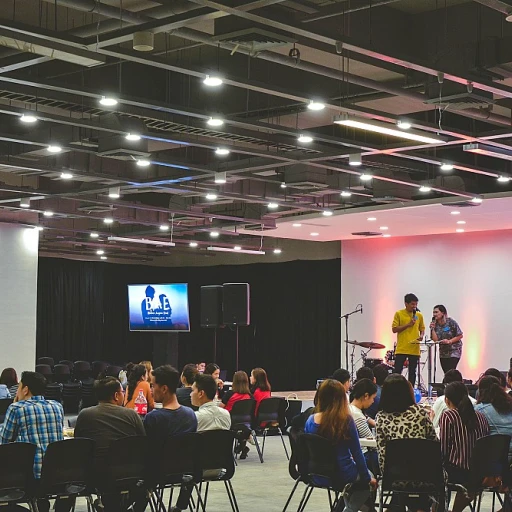Understanding the Importance of Candidate Experience
The Significance of a Strong Candidate Experience
Ensuring a positive candidate experience has become a crucial element for businesses looking to optimize their recruitment processes. As companies strive to enhance their brand image and attract top talent in an ever-competitive job market, focusing on the candidate journey can offer significant advantages. Candidate experience is not merely a buzzword; it is a strategic approach that intersects with various business optimization processes.
A well-optimized candidate experience will not only reinforce a company's brand reputation but also improve its position in local search rankings. Businesses are more likely to attract qualified candidates when they can showcase their efficiency and attention to detail, particularly through platforms like Google Business Profiles (GBP). Optimizing a business profile can help in building a stronger online presence, validating the services offered and promoting products effectively to potential candidates who may be searching online.
Local SEO plays a vital role in ensuring that candidates find and consider local opportunities first, aligning search engine optimization (SEO) efforts with candidate attraction strategies. Such an integrated approach can guide businesses in their operations by merging personal and business optimization strategies into the recruitment process.
In today’s digital age, candidates have an abundance of choices about where to work. Thus, they are inevitably drawn towards companies that not only advertise effectively but offer a seamless candidate journey from start to finish. Establishing effective optimization services for candidate experience helps businesses stand out by providing clarity in their profile optimization and processes.
A robust candidate experience is a reflection of a company’s values and customer-centric approach, ensuring that the business is not just a place where work gets done, but a place where new employees feel valued and engaged from the moment they first encounter the company. For further insights into the critical importance of developing a candidate-centric strategy, you can learn more about
evaluating your current candidate experience.
Identifying Pain Points in the Candidate Journey
Pinpointing Challenges Within the Candidate Journey
Understanding the candidate journey is crucial to optimizing the business processes associated with recruitment. Candidates often face multiple pain points that can deter their enthusiasm and engagement with a prospective company. These pain points may stem from an inefficient application process, unclear communication, or excessively long waiting periods for feedback. Disparities between job descriptions and actual job roles also contribute to candidate dissatisfaction.
To mitigate these challenges and optimize the candidate experience, businesses need to embrace strategies that align with local seo principles. This involves ensuring that the entire recruitment process, from initial contact to final onboarding, is streamlined and friction-free. For starters, identifying and documenting the specific stages where candidates encounter obstacles can be enlightening. Gathering feedback through formal channels, such as structured surveys or informal conversations during the hiring process, provides insights into the experiences of applicants who interact with your business.
The next logical step involves leveraging optimization services, akin to how a company might use gbp optimization to enhance its google business profile. A similar approach can be implemented to refine candidate interactions and remove unnecessary complexities and redundancies. Utilizing business optimization strategies — such as re-evaluation of gmb listings or application forms — can help eliminate candidate deterrents and improve the overall impression of the organization's hiring practices.
Secondly, offering clear, concise, and candid messaging throughout the recruitment stages is paramount. This can be akin to maintaining a high-quality listing standard on google maps, ensuring the customer, or in this case, the candidate, understands the value and expectations from the provided business services.
Each interaction throughout the candidate's journey possesses opportunities for optimization. Focus on enhancing local search visibility helps align business profiles with candidate expectations. Businesses should treat these candidate touchpoints with the same care and attention afforded to product services listings.
The notion of providing a
free consultation can be transposed into offering candidates pre-application information sessions or inviting them to Q&A webinars about company culture and job roles. By adopting best practices similar to those applied in business profile optimization, candidate experience can be significantly enriched. This approach helps reinforce the organization's dedication to transparency and engagement, ultimately fostering a more attractive profile to prospective hires.
Leveraging Technology for a Seamless Experience
Embracing Technology to Enhance Candidate Interaction
Technology plays a pivotal role in transforming the candidate experience by providing a seamless and efficient journey. Leveraging various digital tools can significantly optimize the way businesses manage their recruitment processes and interact with potential candidates.
Firstly, adopting robust applicant tracking systems (ATS) can streamline the recruitment process. These systems help businesses in organizing applications, tracking candidate progress, and maintaining an accurate profile of each candidate. This not only optimizes the internal processes but also enhances the candidate's experience by reducing redundancies and miscommunications.
Additionally, utilizing advanced technology such as AI-driven chatbots can offer immediate assistance and information to candidates. This approach ensures that candidates feel valued and informed at every stage of their application process. In turn, it reflects positively on the company's business profile by showcasing their commitment to effective communication and responsiveness.
The integration of local SEO strategies, like optimizing your Google Business Profile, further bolsters a company's online presence. Maintaining accurate and detailed gmb listings helps increase visibility in local searches, attracting more potential candidates organically.
Moreover, utilizing tools such as Google Maps integration for site interviews or job fair venues can provide candidates with the necessary logistical help. These innovative optimization services enhance the candidate's journey by removing potential hurdles.
For businesses looking to optimize their candidate interactions, consulting with a professional service for process optimization is prudent. Many agencies offer free consultations to help tailor your business processes, ensuring they align with the latest local search optimization trends and best practices.
Ultimately, the seamless integration of cutting-edge technology into the recruitment process can greatly improve the candidate's experience. For those looking to delve deeper into effective communication strategies with candidates, consider exploring how
emailing recruiters in customer support could be optimized to further enrich the candidate engagement process.
Personalization: The Key to Engaging Candidates
Utilizing Personalization Techniques to Drive Candidate Engagement
In today's competitive job market, candidates have a wealth of options at their fingertips. This makes it imperative for businesses to distinguish themselves by optimizing their candidate experience, which can ultimately elevate their google business profile and impact search rankings. One effective strategy is personalizing interactions, a crucial element in creating a memorable and engaging journey for candidates.
Businesses can enhance the candidate experience by tailoring their communication methods and messaging to align with the individual preferences and backgrounds of potential hires. Implementing a business process that involves gathering insights about a candidate’s previous interactions, skills, and career aspirations allows companies to optimize their approach. This form of profile optimization not only aids in strengthening customer relations but also promotes a more inviting atmosphere for potential recruits.
Here's how businesses can personalize their candidate interaction:
- Collect Candidate Data: To personalize effectively, it is necessary to collect and analyze data about each candidate's preferences and behaviors. By doing so, businesses can craft targeted messages that resonate with the candidate, similar to how a gmb listing is tailored to draw local search attention.
- Customized Content Delivery: Utilize precise content strategies that speak to different candidate personas. This can be likened to presenting a well-curated google business listing, ensuring your services and opportunities are presented clearly and appealingly.
- Leverage Technology Tools: Incorporating technology into your recruitment processes can make personalization easier. Tools that track candidate engagement and feedback can help in adjusting strategies for better business optimization.
- Refined Communication Channels: Opt for candidates’ preferred communication methods whether via email, social media, or through business profiles on platforms such as Google's. By doing so, businesses demonstrate they value the candidate's time and preferences.
Ultimately, personalization is about making candidates feel valued and understood. Businesses that focus on optimizing candidate experience with tailored approaches will build a solid foundation for attracting top talent. When candidates experience a journey that meets their needs and expectations, the business not only enhances its reputation but also sets the stage for a loyal and productive workforce.
Training Recruiters for Better Interaction
Empowering Recruiters for Effective Candidate Engagement
Developing a comprehensive candidate experience requires more than just streamlined processes or digital optimization. The linchpin to a successful candidate journey revolves around the fundamental interactions between recruiters and candidates. To ensure a positive and engaging experience, recruiters need targeted training that enhances communication and interpersonal skills, allowing them to better represent their organization while catering to candidates’ needs and expectations.
Training for candidate engagement should focus on several key areas:
- Active Listening and Communication: Recruiters should be adept at understanding candidates' queries and concerns and providing clear, concise responses. This not only fosters trust but also facilitates transparent communication throughout the recruitment process.
- Empathy and Understanding: An empathetic approach helps in recognizing potential candidate frustrations and addressing them effectively, thereby optimizing overall candidate satisfaction.
- Cultural Awareness and Inclusion: Recruiters must be trained in cultural sensitivity to ensure all candidates feel welcomed and valued, irrespective of their background.
Incorporating
business optimization techniques, recruiters can further refine their interaction strategies. By leveraging insights from
local SEO practices and
profile optimization, recruiters can present an attractive
business profile that aligns with candidate expectations. For instance, maintaining an updated
Google Business Profile or enhancing the organization's
gmb listing can significantly impact perceptions and bolster candidate trust.
Moreover, training protocols should involve feedback mechanisms. Implementing a continuous feedback loop will enable recruiters to adjust tactics on the go, ensuring they meet the dynamic demands of both the candidate and the business. This iterative process can boost
search rankings and enhance the company's reputation.
In summary, empowering recruiters through a blend of training and
process optimization enhances their capability to offer tailored experiences. As recruiters become more skilled, the ensuing engagement significantly contributes to a superior candidate journey. This is an essential piece to the broader strategy of candidate experience enhancement, underscoring the need for ongoing training and adaptability.
Measuring Success: Metrics and Feedback
Evaluating Success through Metrics and Feedback
In the realm of candidate experience, comprehensively measuring success is just as crucial as implementing business optimization strategies. Organizations striving to refine their business processes must establish and track specific metrics, using these insights to adjust strategies and improve interactions throughout the candidate journey.
Firstly, key performance indicators (KPIs) can provide a valuable window into the effectiveness of candidate engagement efforts. These might include time-to-hire, candidate satisfaction scores, or the net promoter score (NPS), which gauges the likelihood of candidates recommending your hiring process to others.
Here’s how businesses can approach the evaluation:
- Gathering Feedback: Regularly solicit input from candidates to understand their perceptions and identify areas needing improvement. Feedback can be gathered through surveys or post-interview follow-ups.
- Leveraging Technology: Implement tools that track candidate interactions and touchpoints. This might involve using systems that optimize google processes, enabling you to better understand the efficiency and gaps in your hiring process.
- Collating Data: Centralize the data collected from various sources. This could span from customer relationship management (CRM) systems to applicant tracking systems (ATS), helping businesses build a comprehensive profile for optimization service.
- Analyzing Results: With data in hand, analyze the results to pinpoint trends or specific pain points. This helps shape future business process optimization efforts and adapt services accordingly.
- Benchmarking Performance: Continuously compare your metrics against industry standards or your previous performance. This provides insight into whether your candidate experience optimization strategies are effective.
Ultimately, businesses must not only implement strategies to enhance candidate experience but also diligently track the results. Such a proactive approach not only helps in optimizing local search and google business profiles but also enhances the organization's reputation in the long run. For a deeper understanding of the initial step in candidate journey optimization, consider exploring the blog on understanding the importance of evaluating your current candidate experience
here.












